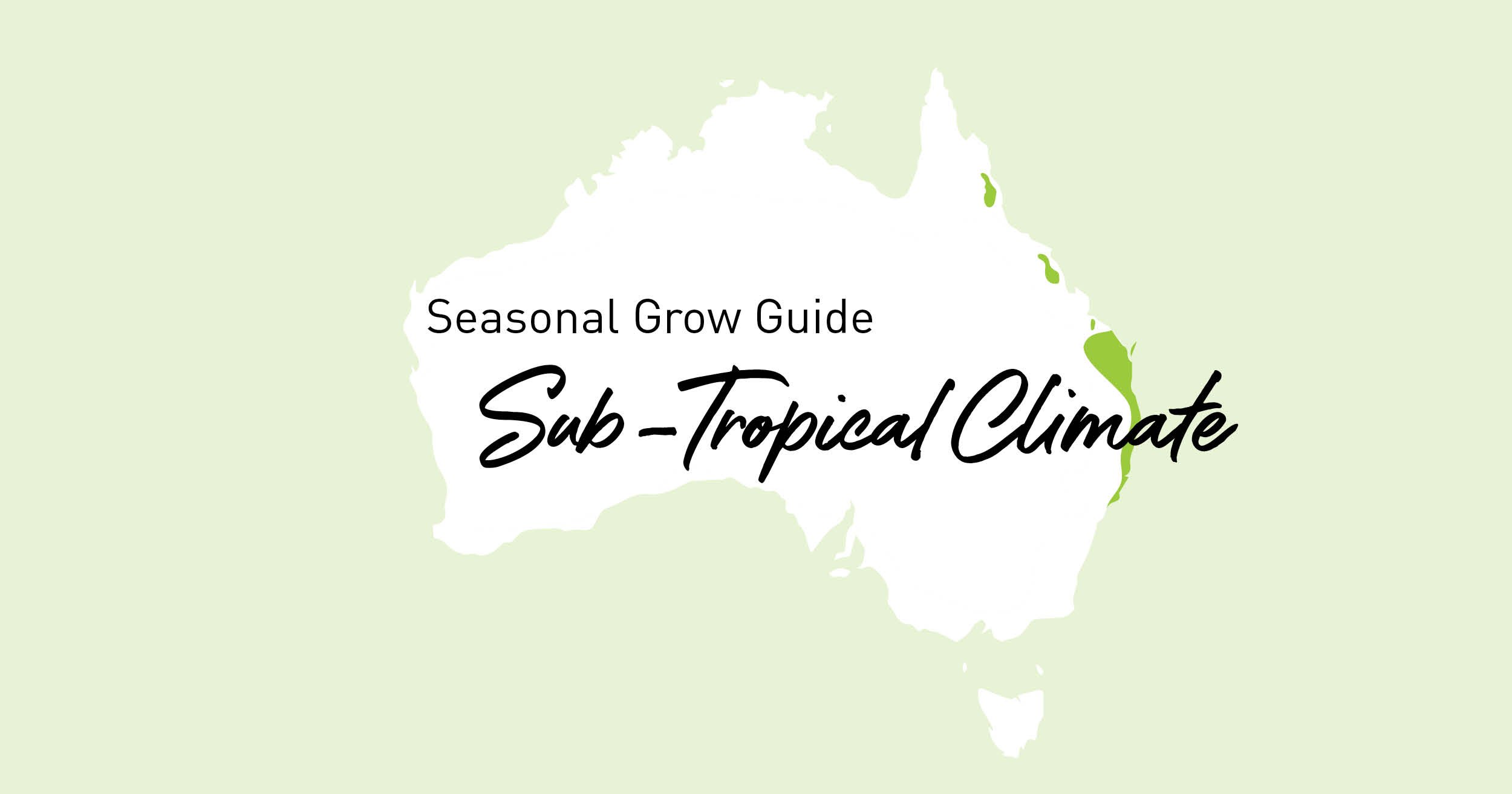Australia has multiple climates, each offering a unique variety of fruits and vegetables that thrive in different seasons.
 In the Sub-Tropical climate region, cities like Brisbane, Gold Coast, and Sunshine Coast enjoy a lush and diverse agricultural landscape. From the sweet and refreshing tropical fruits of summer to the hearty and comforting vegetables of winter, this region experiences a wide range of produce throughout the year.
In the Sub-Tropical climate region, cities like Brisbane, Gold Coast, and Sunshine Coast enjoy a lush and diverse agricultural landscape. From the sweet and refreshing tropical fruits of summer to the hearty and comforting vegetables of winter, this region experiences a wide range of produce throughout the year.
Take a look at whats good to grow throughout the seasons whether it be Summer, Autumn, Winter or Spring:
What to grow in Summer (sub-tropical zone)
When it comes to gardening in the sub-tropical climate of Australia during the summer months, there is a plethora of fruits and vegetables that thrive in the warm weather. From the juicy sweetness of watermelon to the refreshing crunch of cucumbers, there are endless possibilities for a bountiful harvest. Some popular choices for summer planting include tomatoes, capsicum, and sweet corn, all of which can be enjoyed fresh from the garden or incorporated into delicious summer dishes. Whether you're a seasoned gardener or just starting out, the summer season in this region offers a vibrant and diverse selection of produce to cultivate and enjoy. So roll up your sleeves, grab your gardening tools, and get ready to reap the rewards of a fruitful summer garden in the sub-tropical climate of Australia.
Below we look at what fruit and vegetables to grow in the sub-tropical part of Australia:
Summer Vegetable, fruits and herbs to grow:
Amaranth, Artichoke (Globe), Asparagus, Asparagus Pea, Basil, Beans (Climbing and bush), Beetroot, Burdock, Cabbage (loose headed), Cabbage (tight-headed), Capsicum, Carrots, Celeriac, Celery, Chilli, Chives, Choko, Cucumber, Eggplant, Endive, Ginger, Leeks, Lettuce, Luffa, Malabar Greens, Okra, Potatoes, Pumpkin, Radish, Rockmelon, Rosella, Salsify, Silverbeet, Squash, Sunflower, Sweet Corn, Tomatoes, Watermelon
Photos in order of month to grow: DECEMBER/ JANUARY/ FEBRUARY
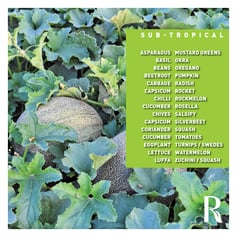
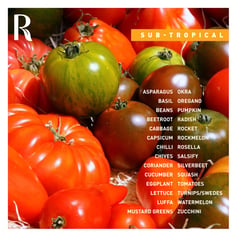
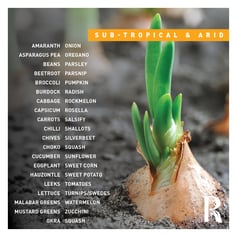
What to grow in Autumn (sub-tropical zone)
As the days gradually become shorter and the temperatures start to cool down, autumn arrives, bringing with it a delightful array of fruits such as passion fruits, guavas, and custard apples. These fruits not only offer a tantalising taste but also provide a rich source of essential vitamins and minerals.
As autumn arrives in the tropical climate of Australia, the scorching heat starts to subside, making way for pleasant and temperate weather.
Autumn Vegetable, fruits and herbs to grow:
Amaranth, Asparagus Pea, Beans (Climbing and bush), Beetroot, Bok Choy, , Broccoli, Brussels Sprouts, Burdock, Cabbage (loose headed), Cabbage (tight-headed), Capsicum, Carrots, Celeriac, Celery, Chicory, Chilli, Chives, Cucumber, Eggplant, Endive, Florence Fennel, Garlic, Huauzontle, Jerusalem Artichoke, Kale, , Kohlrabi, Leeks, Lettuce, Malabar Greens, Mangle-wurzel, Mizuna, Mustard Greens, Onion, Oregano, Pak Choy, , Parsley, Parsnip, Peas/Snow Peas, Radish, Rocket, Rockmelon, Rosella, Salsify, Shallots, Silverbeet, Spinach, Squash, Sunflower, Sweet Corn, Tomatoes, Turnip, Turnips / Swedes, Zucchini / Squash
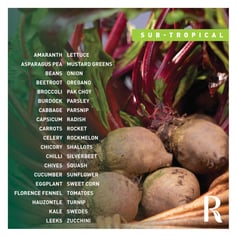
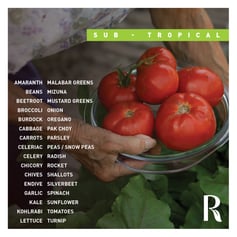
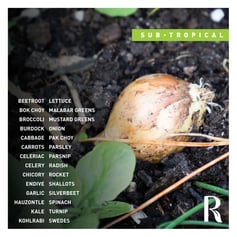
Photos in order of month to grow: MARCH/ APRIL/ MAY
What to grow in Winter (sub-tropical climate)
In the sub-tropical climate of Australia during winter, there are still plenty of fruits and vegetables that thrive despite the cooler temperatures. From hearty root vegetables like carrots and parsnips to leafy greens such as kale and silverbeet, the winter season offers a diverse array of produce to cultivate in your garden.
Embrace the season by growing a variety of winter crops and enjoy the fresh and nutritious harvest that the sub-tropical climate has to offer during the colder months. So, grab your gardening tools, prepare your soil with some ActivGrow Soil Improver, and get ready to grow a bountiful winter garden.
Winter Vegetable, fruits and herbs to grow:
Amaranth, Artichoke (Globe), Asparagus, Asparagus Pea, Basil, Beans (Climbing and bush), Beetroot, Bok Choy, Burdock, Cabbage (loose headed), Cabbage (tight-headed), Capsicum, Carrots, Cauliflower, Celeriac, Celery, Chicory, Chilli, Chives, Cucumber, Eggplant, Endive, Florence Fennel, Garlic, Huauzontle, Jerusalem Artichoke, Kale, Kohlrabi, Lettuce, Malabar Greens, Mangle-wurzel, Mizuna, Mustard Greens, Okra, Onion, Parsnip, Peas/Snow Peas, Potatoes, Pumpkin, Quinoa, Radish, Rocket, Rockmelon, Shallots, Silverbeet, Spinach, Spring Onions, Squash, Sunflower, Sweet Corn, Tomatoes, Turnip, Turnips / Swedes, Watermelon, Zucchini / Squash
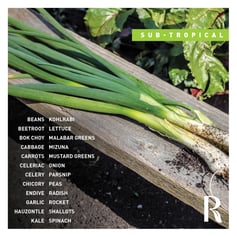
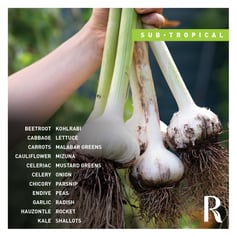
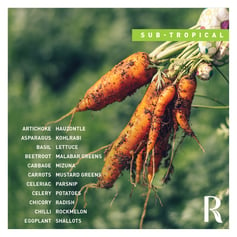
Photos in order of month to grow: JUNE/ JULY/ AUGUST
What to grow in Spring (sub-tropical climate)
Spring is a vibrant season in the sub-tropical climate of Australia, offering a wide variety of fruits and vegetables to cultivate in your garden. From the earthy sweetness of beetroots to the zesty kick of chillies, there is no shortage of fresh produce to enjoy during the spring months. Whether you're a seasoned gardener or just starting out, spring is the perfect time to plant a diverse range of crops like capsicum, carrots, and cucumbers. Embrace the warmer weather and longer days by growing an array of herbs like basil and chives, adding a burst of flavour to your dishes. So, grab your gardening tools, prepare your soil, and get ready to sow the seeds for a bountiful spring harvest in the sub-tropical region of Australia.
Spring Vegetable, fruits and herbs to grow:
Amaranth, Artichoke (Globe), Asparagus, Asparagus Pea, Basil, Beans (Climbing and bush), Beetroot, Burdock, Cabbage (loose headed), Capsicum, Carrots, Celeriac, Celery, Chicory, Chilli, Chives, Choko, Coriander, Cucumber, Eggplant, Florence Fennel, Huauzontle, Jerusalem Artichoke, Kale, , Kohlrabi, Lettuce, Long Yam, Luffa, Malabar Greens, Mustard Greens, Okra, Oregano, Potatoes, Pumpkin, Quinoa, Radish, Rocket, Rockmelon, Rosella, Salsify, Shallots, Silver beet, Spinach, Spring Onions, Squash, Sunflower, Sweet Corn, Sweet Potato, Tomatoes, Turnip, Turnips / Swedes, Warrigal Greens, NZ Spinach, Water Chestnut, Watermelon, Zucchini / Squash
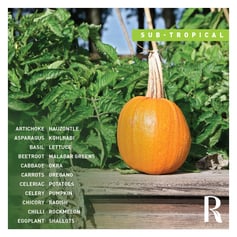
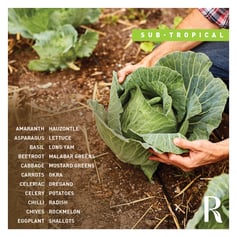
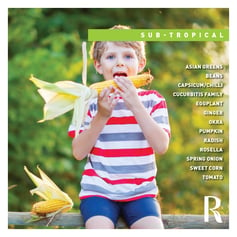
Photos in order of month to grow: SEPTEMBER/ OCTOBER/ NOVEMBER
_MEB.png?width=842&height=596&name=RP_HorizontalColour(R)_MEB.png)

